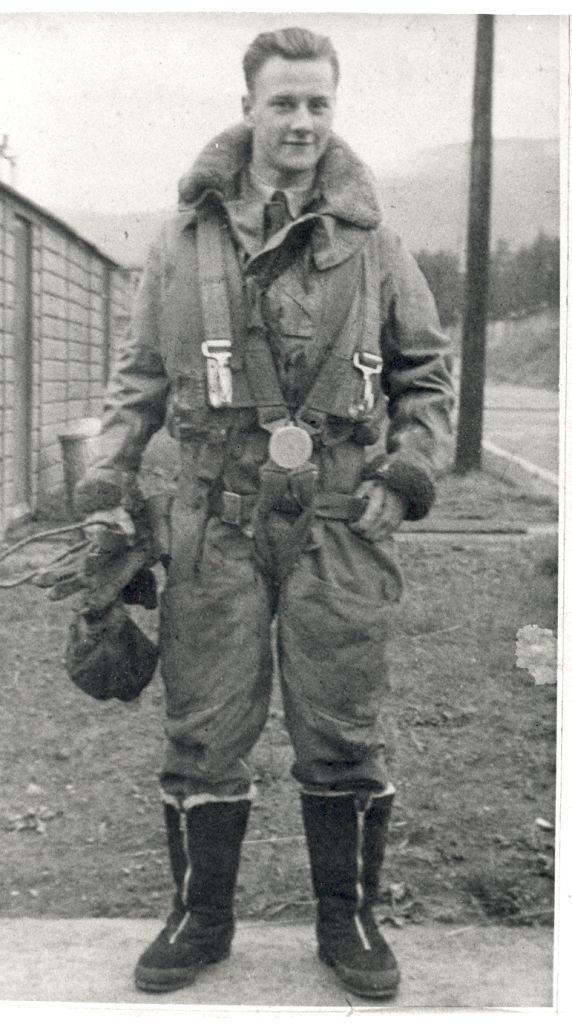Gordon Erod Johnson
Date of death: 11.11.1942
Area: Purston Jaglin
Regiment: Royal Air Force Volunteer Reserve
Family information: Son of George and Edith Johnson, Junction Hotel, Purston
Rank: Sergeant
Service number: 1036704
War Service
Gordon Erod Johnson was an Air Gunner in 101 Squadron Royal Air Force Volunteer Reserve. He was killed in action on 30-31 March 1944 in the infamous Nuremburg Raid. He was 21 years old.
He was son of George and Edith Johnson and the brother of Kathleen Johnson of Featherstone.
He is buried in Hanover War Cemetery, Germany, Grave 5.H.3.
101 Squadron, which was stationed at Ludford Magna between Louth and Market Rasen, was flying ABC Lancasters. ABC was a device called Airborne Cigar. Each Lancaster 101 Squadron was fitted with three transmitters and manned by an extra German speaking crew member who was to jam the German fighter controllers’ instructions. These planes mixed into the bomber stream on all major raids. Although the ABC system was known to the Germans, it caused some difficulty for the enemy controllers. In late 1943 the order ‘All butterflies go home’ was broadcast from England on the German frequency causing many German planes to land. 101 Squadron’s leader was Air Vice Marshal E.A.B. Rice whose headquarters was at Bawtry Hall.
During the Nuremberg Raid only one aircraft in 101 Squadron had a New Zealand pilot officer - Lancaster LM463 - Gordon Johnson’s plane. In the early morning of 31st March, with a crew on its second mission, the plane was brought down by fighter attack. Pilot Officer A. E. Lander bailed out and was taken prisoner. The plane crashed at Dillenburg. There were six killed and two prisoners.
Soon after the raid set off the ABC men were warming up their sets, and over Charleroi in Belgium, they were in operation giving out false messages. In the first skirmishes with German fighters, in an area from the German frontier to the Rhine, we lost 10 Lancasters and two Halifaxes.
When Lander’s plane was hit this was his story. “After I told the crew to abandon the aircraft, I tried to keep the plane straight and level as long as I could until the flames entered the cockpit. I covered my face with my left arm but lost control of the aircraft which went into a spin throwing me out of my seat into a position with my back against the cockpit window. Many thoughts passed through my mind as I lay there. Anyway, things were getting bloody hot in there and my clothes were starting to burn, so I put my feet against the pilot’s seat and, by straightening my legs, I managed to push myself out through the window and flipped out over the wing. How quiet and cool everything was then! I realised I still had a chance and felt for the rip cord.” Unfortunately only one other man in Lander’s crew had been able to get out. The plane crashed at Dillenburg.
101 Squadron had suffered the heaviest losses of the night. Seven of their aircraft and 56 men were missing. An Australian pilot ‘Dutch Holland’ said, “We waited and waited and waited. We were an experienced crew and accustomed to losing the odd one or two aircraft and this was the era when we in Bomber Command were losing quite large numbers on every raid. But with nearly one third of our squadron missing, this was a big kick in the guts for us all. We waited up until nearly mid-day before going to our huts - stunned, shocked and silent, each crew member wrapped in his own mental anguish.”
It appears that Gordon Johnson was buried near Dillenburg, west of Bonn and later moved to Hanover for burial in a War Grave Cemetery.
 Gordon Erod Johnson
Gordon Erod Johnson

